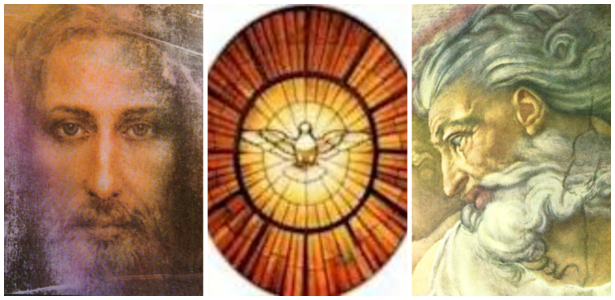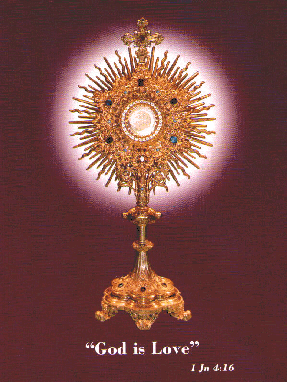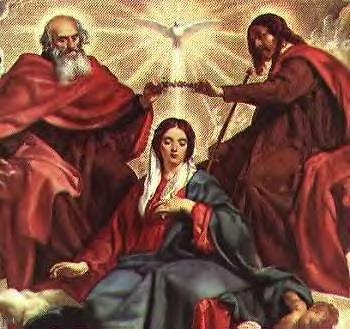|
"Since Christ is the only way to the Father, in order to highlight His living and saving presence in the Church and the world, the International Eucharistic Congress will take place in Rome, on the occasion of the Great Jubilee. The Year 2000 will be intensely Eucharistic: in the Sacrament of the Eucharist the Savior, who took flesh in Mary's womb twenty centuries ago, continues to offer Himself to humanity as the source of Divine Life," Pope John Paul II, Tertio Millennio Adveniente ("As the Third Millennium Draws Near").
The Blessed Trinity longs to pour out an infinite torrent of grace upon the world!
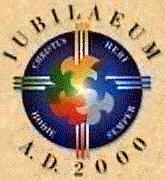
The goal of the Jubilee Year
is an encounter with God the Father
in the Holy Spirit
through Christ the Savior
in His Church,
especially in the Sacraments
of Penance and the Eucharist.
(Pope John Paul II, Incarnationis Mysterium, "The Mystery of the Incarnation")
Consecration to the Blessed Trinity
I vow and consecrate to God all that is in me: my memory and my actions to God the Father; my understanding and my words to God the Son; my will and my thoughts to God the Holy Spirit; my heart, my body, my tongue, my senses and all my sorrows to the sacred Humanity of Jesus Christ, "who was contented to be betrayed into the hands of wicked men and to suffer the torment of the Cross" (St. Francis de Sales).
Fatima Prayers
"O Most Holy Trinity, Father, Son and Holy Spirit, I adore Thee profoundly. I offer Thee the most precious Body, Blood, Soul and Divinity of Jesus Christ, present in all the Tabernacles of the world, in reparation for the outrages, sacrileges and indifference by which He is offended, and by the infinite merits of the Sacred Heart of Jesus and the Immaculate Heart of Mary, I beg the conversion of poor sinners."
"O Most Holy Trinity, I adore Thee!
My God, My God, I love Thee in the Most Blessed Sacrament!"
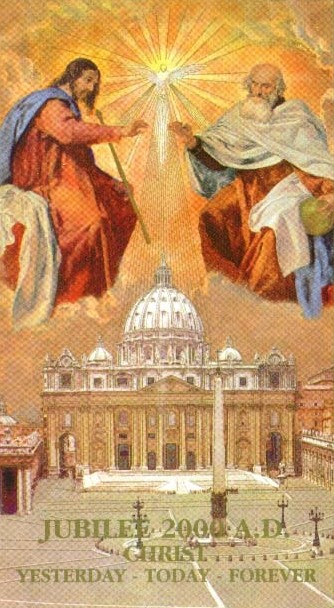
Prayer to the Most Holy Trinity
for the Celebration of the Great Jubilee
Pope John Paul II
1. Blessed are you, Father,
who, in your infinite love,
gave us your only
begotten Son.
By the power of the Holy Spirit he became incarnate
in the spotless womb of the Virgin Mary
and was born in Bethlehem
two thousand years ago.
He became our companion on life's path
and gave new meaning to our history,
the journey we make together
in toil and suffering,
in faithfulness and love,
towards the new heaven and the new earth
where You, once death has been vanquished,
will be all in all.
Praise and glory to You, Most Holy Trinity,
you alone are God most high!
2. By your grace, O Father, may the Jubilee Year
be a time of deep conversion
and of joyful return to you.
May it be a time of reconciliation between people,
and of peace restored among nations,
a time when swords are beaten into ploughshares
and the clash of arms gives way to songs of peace.
Father, grant that we may live this Jubilee Year
docile to the voice of the Spirit,
faithful to the way of Christ,
diligent in listening to your Word
and in approaching the wellsprings of grace.
Praise and glory to You, Most Holy Trinity,
you alone are God most high!
3. Father, by the power of the Spirit,
strengthen the Church's commitment
to the new evangelization
and guide our steps along the pathways of the world,
to proclaim Christ by our lives,
and to direct our earthly pilgrimage
towards the City of heavenly light.
May Christ's followers show forth their love
for the poor and the oppressed;
may they be one with those in need
and abound in works of mercy;
may they be compassionate towards all,
that they themselves may obtain indulgence
and forgiveness from you.
Praise and glory to You, Most Holy Trinity,
you alone are God most high!
4. Father, grant that your Son's disciples,
purified in memory
and acknowledging their failings,
may be one, that the world may believe.
May dialogue between the followers
of the great religions prosper,
and may all people discover
the joy of being your children.
May the intercession of Mary,
Mother of your faithful people,
in union with the prayers of the Apostles,
the Christian martyrs,
and the righteous of all nations in every age,
make the Holy Year a time of renewed hope
and of joy in the Spirit
for each of us and for the whole Church.
Praise and glory to You, Most Holy Trinity,
you alone are God most high!
5. To you, Almighty Father,
Creator of the universe and of mankind,
through Christ, the Living One,
Lord of time and history,
in the Spirit who makes all things holy,
be praise and honour and glory
now and for ever. Amen!
"O eternal Trinity, You are a deep sea in which the more I seek the more I find, and the more I find, the more I seek to know You. You fill us insatiably, because the soul, before the abyss which You are, is always famished; and hungering for You, O eternal Trinity, it desires to behold truth in Your light. As the thirsty hart pants after the fount of living water, so does my soul long to leave this gloomy body and see You as You are, in truth.
"O unfathomable depth! O Deity eternal! O deep ocean! What more could You give me than to give me Yourself? You are an ever-burning Fire; You consume and are not consumed. By Your fire, You consume every trace of self-love in the soul. You are a Fire which drives away all coldness and illumines minds with its light, and with this light You have made known Your truth. Truly this light is a sea which feeds the soul until it is all immersed in You, O peaceful Sea, eternal Trinity! The water of this sea is never turbid; it never causes fear, but gives knowledge of the truth. This water is transparent and discloses hidden things; and a living faith gives such abundance of light that the soul almost attains to certitude in what it believes.
"You are the supreme and infinite Good, good above all good; good which is joyful, incomprehensible, inestimable; beauty exceeding all other beauty; wisdom surpassing all wisdom, because You are Wisdom itself. Food of angels, giving Yourself with fire of love to men! You are the garment which covers our nakedness; You feed us, hungry as we are, with Your sweetness, because You are all sweetness, with no bitterness. Clothe me, O eternal Trinity, clothe me with Yourself, so that I may pass this mortal life in true obedience and in the light of the most holy faith with which You have inebriated my soul."- St. Catherine of Siena
ABBA FATHER
Abba is the most affectionate word in the Hebrew language,
meaning "Daddy" or "Papa"
"As a help towards faithful fulfillment of their ministry, priests should love to talk daily with Christ, the Lord, in their visit to the most Blessed Sacrament, and in their personal devotion to it... By this spirit they themselves, and with them the people entrusted in their care, will unite themselves with Christ, the Mediator of the New Testament, and be able to, as adopted sons, cry 'Abba! Father!'" (Rom 8:15). (Second Vatican Council)
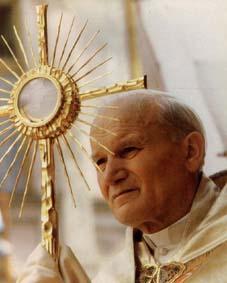
Heavenly Father, increase our faith in the Real Presence of Your Son, Jesus Christ in the Holy Eucharist. We are obliged to adore Him, to give Him thanks and to make reparation for sins. We need Your peace in our hearts and among nations. We need conversion from our sins and the mercy of Your forgiveness. May we obtain this through prayer and our union with the Eucharistic Lord. Please send down the Holy Spirit upon all peoples to give them the love, courage, strength and willingness to respond to the invitation to Perpetual Eucharistic Adoration. We beseech You to spread perpetual exposition of the Most Blessed Sacrament in parishes around the world. We ask this in the name of Jesus the Lord. Amen.
Our Father
THY WILL BE DONE
A Meditation by St. Peter Julian Eymard
Our Father Who are in Heaven
in the heaven of the Eucharist,
to You Who are seated on the throne of grace and love,
be benediction, and honor, and power and glory
for ever and ever!
Hallowed be Your Name
first in ourselves, through the spirit of
Your humility, obedience, and charity.
May we in all humility and zeal
make You known, loved, and adored by all men
in the Holy Eucharist,
Thy Kingdom Come
Thy Eucharistic kingdom.
Rule Thou alone forever over us
for Your greater glory
through the power of Your love,
the triumph of Your virtues,
and the grace of a Eucharistic vocation
in my state as a layman.
Grant us the grace and mission of Your holy love
so that we may be able to effectively extend
Your Eucharistic kingdom everywhere
and realize the desire you expressed:
'I have come to cast fire on the earth;
and what would I, but that it be kindled?'
Oh! that we might be the incendiaries of this heavenly fire!
Thy will be done on earth as it is in Heaven
Grant us the grace to find all our joy
in wanting You alone,
in desiring You alone,
and in thinking of You alone.
Grant that by denying of ourselves always
and in all things,
we may find light and life
in obeying Your good, acceptable and perfect Will.
I will what You will.
I will it because You will it.
I will it as You will it.
I will it as long as You will it.
Perish our thoughts and desires
if they are not purely from You, for You and in You.
Give us this day our daily bread
You are our Eucharistic Lord
and You alone will be our food and clothing,
our riches and glory,
our remedy in illness,
and our protection against all evil.
You will be all things to us.
And forgive us our trespasses
Forgive me Jesus, for I am sorry for all my sins
just as they stand in your eyes.
As we forgive those who trespass against us
For anyone who has offended us in any way,
with our whole heart we forgive them
and desire for them the gifts of Your love.
And lead us not into temptation but deliver us from evil
Deliver us Jesus, from the demon of pride,
impurity, discord and complacency.
Deliver us from the cares and worries of life
so that with a pure heart and a free mind
we may joyfully spend our life
and devote all that we are and all that we have
in the service of our Eucharistic Lord.
Amen.
In You, O Lord Jesus, have I hoped;
let me not be confounded forever.
You alone are good.
You alone are powerful.
You alone are eternal.
To You alone be honor and glory,
love and thanksgiving forever and ever.
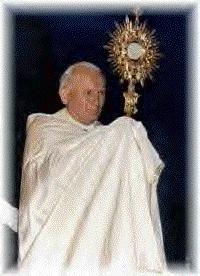 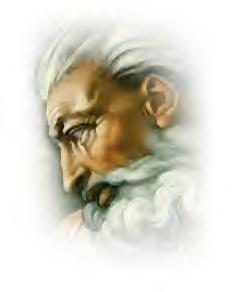
Our Father
Thy Kingdom Come
"Our Father Who are in Heaven in the heaven of the Eucharist... may we in all humility and zeal make You known, loved and adored by all men in the Holy Eucharist," wrote St. Peter Julian Eymard, the Apostle of the Eucharist, in the mid-nineteenth century. As we approach the great Jubilee year 2000, Our Holy Father on earth has summoned us to make Our Father "in the heaven of the Eucharist" more "known, loved and adored" than ever before. For as he proclaimed in his June 1993 homily at the 45th International Eucharistic Congress in Seville, Spain,
"I hope that (this form of) Perpetual Adoration, with permanent exposition of the Blessed Sacrament will continue into the future. Specifically, I hope that the fruit of this Congress results in the establishment of Perpetual Eucharistic Adoration in all parishes and Christian communities throughout the world."
On December 2, 1981, Pope John Paul II began Perpetual Eucharistic Adoration with Exposition in a chapel at St. Peter's in Rome, with the hope and prayer that every Catholic Church throughout the world would follow. His actions echoed the prayer of St. Peter Julian Eymard who wrote, "Thy Kingdom Come, Thy Eucharistic Kingdom. Rule Thou alone forever over us for Your greater glory through the power of your love."
In his encyclical Dominicae Cenae, On the Mystery and Worship of the Holy Eucharist, Our Holy Father writes that "the Church and the world have a great need of Eucharistic Adoration. Jesus waits for us in this Sacrament of Love. Let us be generous with our time in going to meet Him in Adoration and in contemplation that is full of faith, and ready to make reparation for the great faults and crimes of the world. May our adoration never cease." We live in an age that has lost touch with the Reality of the Personal Love of God. Many have left or are leaving Christ's Bride the Church, because they have not encountered His Everpresent Love in our midst. What better time then, and in what better way, can we proclaim and invite them to experience the Personal Love of Jesus than through Perpetual Eucharistic Adoration, a personal encounter with Him?
Time and time again, Our Holy Father has repeated his great desire for us to spread Perpetual Adoration of Jesus in the Most Holy Eucharist throughout the world. When the Pope traveled to Seoul, Korea in 1989, he began his visit by going to Good Shepherd Church where Jesus is adored perpetually in the Most Blessed Sacrament. Of the importance of this visit, Our Holy Father says, "It is most fitting that my first stop among the Korean people should be in a Church such as this, where the minds and hearts of the faithful are constantly raised up in adoration before Christ in the Most Holy Eucharist."
During his recent visit to the Americas, the Pope continued to witness to our great need – as a country and world – for Perpetual Eucharistic Adoration. In the Mass he celebrated in honor of the Sacred Heart at the Trans World Dome in St. Louis, Our Holy Father said, "In Eucharistic Adoration we meet the merciful love of God that passes through the Heart of Jesus Christ." Upon his arrival to the Cathedral in St. Louis for the interdenominational prayer service, His Holiness first publicly knelt before the Jesus in Blessed Sacrament for several moments of prayer, drawing strength from the Personal Presence of Jesus Who is Unity and Love.
Our Holy Father on earth wants us to do the will of Our Eternal Father in Heaven. What is His will? The establishment of His Kingdom on earth. How will His Reign come? Through Perpetual Eucharistic Adoration. For as St. Peter Julian Eymard writes,
"We must take Christ from the solitude of His tabernacle, so that He may place
Himself at the head of Christian society, to guide and save it. We must build stately
palaces, royal thrones, organize a court of faithful servants, a family of friends and
a host of adorers and apostles. Such a public and solemn protestation of our faith
in the Kingship of Christ, in the reality of His sacramental presence is a prime
necessity of our day."
This is why Our Holy Father said in his first encyclical, "Every member of the Church, especially Bishops and Priests, must be vigilant in seeing that this Sacrament of Love shall be at the center of the life of the people of God, so that through all of the manifestations of worship due It, Christ shall be given back 'love for love; and truly become the life of our souls,'" (Redemptor Hominis, The Redeemer of Man).
When Pope John Paul II visited the Basilica of Montmartre in France in 1980, he spoke beautifully on the meaning Perpetual Adoration of Jesus in the Most Blessed Sacrament, saying, "We come here to meet the Heart of Jesus pierced for us, from which water and blood gush. It is the redeeming love, which is at the origin of salvation, of our salvation, which is at the origin of the Church. Now still, today, the living Christ loves us and presents his heart to us as the source of our redemption... We are called not only to meditate and contemplate on this mystery of Christ's love; we are called to take part in it. It is the mystery of the Holy Eucharist, the center of our faith, the center of our worship of Christ's merciful love manifested in his Sacred Heart, a mystery which is adored here night and day. In the Holy Eucharist – this is also the meaning of perpetual adoration–we enter the movement of love from which all interior progress and all apostolate efficacy springs."
In his encyclical Christifideles Laici, The Members of Christ's Faithful People, Our Holy Father echoes the words of the Second Vatican council, calling all of us to go into the vineyard, "The Council, then, makes an earnest plea in the Lord's name that all lay people give a glad, generous, and prompt response to the impulse of the Holy Spirit and to the voice of Christ, who is giving them an especially urgent invitation at this moment." For as Our Holy Father has also said, summoning the laity to a new and an urgent Eucharistic Evangelization, "The encouragement and the deepening of Eucharistic Worship are proofs of that authentic renewal which the Council set itself as an aim and of which they are the central point."
As we rapidly approach the Jubilee year and prepare for the celebration of
the 2000th birthday of Jesus, let us do the will of Our Father in Heaven, as spoken to us by Our Holy Father on earth, that Jesus in the Most Blessed Sacrament may be adored perpetually in "all parishes and Christian communities throughout the world." May we respond generously and "take an active, conscientious and responsible part in the mission of the Church in this great moment in history made especially dramatic by occurring on the threshold of the Third Millennium," (Christifideles Laici, The Members of Christ's Faithful People). For as Our Holy Father goes on to say, "A new state of affairs today both in the Church and in social, economic, political and cultural life, calls with a particular urgency for the action of the lay faithful. If lack of commitment is always unacceptable, the present time renders it even more so. It is not permissible for anyone to remain idle."
With St. Peter Julian Eymard let us pray for the coming of Our Father's Kingdom on earth, "Grant us the grace and mission of Your holy love so that we may be able to effectively extend Your Eucharistic kingdom everywhere." For as Our Holy Father, Pope John Paul II, "Since Christ is the only way to the Father, in order to highlight His living and saving presence in the Church and the world, the International Eucharistic Congress will take place in Rome, on the occasion of the Great Jubilee. The Year 2000 will be intensely Eucharistic: in the Sacrament of the Eucharist the Savior, who took flesh in Mary's womb twenty centuries ago, continues to offer Himself to humanity as the source of Divine Life," (Tertio Millennio Adveniente). And as Pope John Paul II has beckoned us over and over during his papacy, "Open, indeed, open wide the doors to Christ!" May we open our hearts and our Churches that Jesus in the Most Blessed Sacrament may be adored, that we may do the will of Our Father in Heaven and Our Father on earth today, and His Kingdom may come.
Copyright 1999, Mary Beth Bracy. All rights reserved.
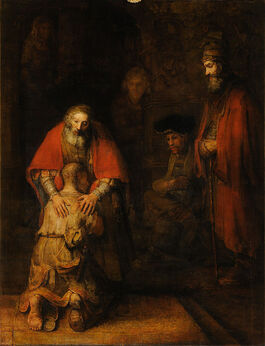
"Let no one in this jubilee year exclude himself from the Father's embrace. Let no one behave like the elder brother in the Gospel parable who refuses to enter the house to celebrate (cf. Lk 15:25-30). May the joy of forgiveness be stronger and greater than any resentment." (Pope John Paul II)
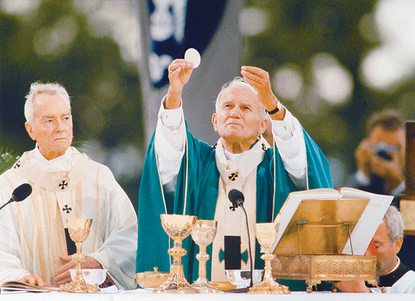
"Father, grant that we may live this Jubilee Year docile to the voice of the Spirit, faithful to the way of Christ, diligent in listening to your Word and in approaching the wellsprings of grace." (Pope John Paul II)
The Word Became Flesh
By Pope John Paul II
- This truth is stressed by John in the Prologue of his gospel when he says: "The Word became flesh and dwelt among us" (1:14). By saying "became flesh", the Evangelist is alluding to his human nature not only in its mortal condition, but also in its entirety. The Son of God assumed all that is human, except sin. The Incarnation is the fruit of an immense love, which spurred God willingly to share our human condition to the full.
In becoming man, the Word of God brought about a fundamental change in the very condition of time. We can say that in Christ human time was filled with eternity.
The Word existed in perfect communion with the Father
This transformation touches the destiny of all humanity, since "by his Incarnation, he, the Son of God, has in a certain way united himself with each man" (Gaudium et spes, n. 22). He came to offer everyone participation in his divine life. The gift of this life includes sharing in his eternity. Jesus said so especially with regard to the Eucharist: "He who eats my flesh and drinks my blood has eternal life" (Jn 6:54). The effect of the Eucharistic banquet is that we already possess this life. Elsewhere Jesus indicated the same possibility with the symbol of the living water that could quench thirst, the living water of his Spirit given in view of eternal life (cf Jn 4:14). The life of grace thus reveals a dimension of eternity that lifts up our earthly existence and directs it, with true continuity, to our entrance into heavenly life.
Excerpt from L'Osservatore Romano December 17/24, 1997
INCARNATION
"The Word became flesh and made his dwelling among us," John 1:14.
O Word Incarnate, O Word Divine,
Why would thee make my dwelling place thine?
Source of all redeeming grace,
How awed we are to see thy face!
Light so pure, so Holy and bright,
Maker of the stars of night,
Immortal Godhead, one in three,
Font of eternal mystery,
Making thyself so tiny and small,
A babe, the most helpless creature of all!
Born in a cave, so dark and so cold,
Slept in a manger, thus it is told.
Succored at Mother Mary's breast,
Good St. Joseph provided the rest.
Suffering servant, victim soul,
Looked down upon by men, as was foretold.
Scourged, spat upon and crucified,
Pierced by a sword, after you died.
Raised by thy Father to thy heavenly home, glorified
No longer thy greatness to hide!
Enduring love, whom the heavens cannot contain,
Thou who stay with us, on this low earthly plane.
For thou art mercy, thou art love--thus could not orphan us.
Thou sent the Spirit, but remain too in thy tabernacle and shepherd thus.
In thy Sacred Eucharistic presence, a piece of bread, a Host,
thou remainest, to feed us, guide, comfort, heal and love us the most!
O praise you my Savior, Redeemer and Infant King so fine,
All thanksgiving to thee for making thy dwelling place mine!
Copyright 1998, Linda Bracy. All rights reserved.
Peter's Faith in The Eucharist
By Our Holy Father, Pope John Paul II
On two occasions before the Passion Peter had already professed his faith in Christ.
On one occasion, after the announcement of the Eucharist in the neighbourhood of Capernaum, Jesus, on seeing many of his disciples turning their backs on him, asked the apostles: "Will you also go away?" (Jn 6:67). Peter replied with those words inspired from on high: "Lord, to whom shall we go? You have the words of eternal life; and we have believed, and have come to know, that you are the Holy One of God" (Jn 6:68-69).
On another occasion Peter's profession of faith took place near Caesarea Philippi, when Jesus asked the apostles: "Who do you say that I am?" According to Matthew, "Simon Peter replied: 'You are the Christ, the Son of the living God' '' (Mt 16:15-16).
Now, on the day of Pentecost, Peter, by this time freed from the crisis of fear that had led him to deny Jesus on the eve of the Passion, professed that same faith in Christ, strengthened by the paschal event, and he proclaims openly before all those people that Christ was risen! (cf. Acts 2:24 ff.).
Excerpt from L'Osservatore Romano October 25, 1989
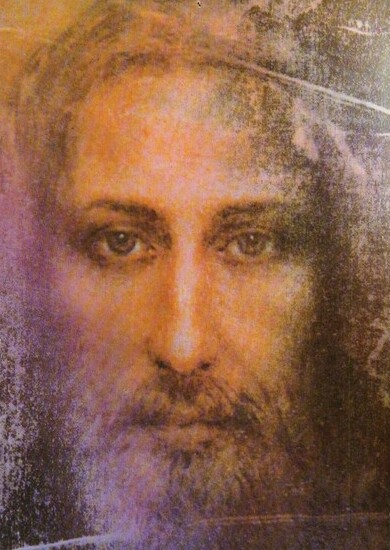
True Face of Messiah Gradually Revealed
By Pope John Paul II
- Other eminent figures of the Jewish people shine in their full value in the light of Christ. This is the case with Jacob, as can be seen in the Gospel account of Jesus' meeting with the Samaritan woman.
The well which the ancient patriarch had left to his sons became, in Christ's words, a prefiguring of the water he would give, the water of the Holy Spirit, welling up to eternal life (cf. Jn 4:14).
Moses also announces some of the basic aspects of Christ's mission. As liberator of the people from their slavery in Egypt, he symbolically anticipates the true exodus of the New Covenant, constituted by the paschal mystery. As legislator of the Old Covenant, he prefigures Jesus who promulgates the Gospel Beatitudes and guides believers with the interior law of the Spirit. Even the manna that Moses gives the hungry people is a basic figure of God's definitive gift. "Truly, truly, I say to you, it was not Moses who gave you the bread from heaven; my Father gives you the true bread from heaven. For the bread of God is that which comes down from heaven, and gives life to the world" (Jn 6:32-33). The Eucharist fulfils the meaning hidden in the gift of manna. Christ thus presents himself as the true and perfect fulfillment of what was symbolically foretold in the Old Covenant.
Another of Moses' acts has a prophetic value: to quench the thirst of the people in the desert, he makes water flow from the rock. On the "feast of Tabernacles", Jesus promises to quench humanity's spiritual thirst: "If anyone thirst, let him come to me and drink. He who believes in me, as Scripture says, 'Out of his heart shall flow rivers of living water'" (Jn 7:37-38). The abundant outpouring of the Holy Spirit announced by Jesus with the image of rivers of living water is prefigured in the water given by Moses. St Paul, in referring to this messianic event, also stresses the mysterious reference to Christ: "All drank the same supernatural drink. For they drank from the supernatural Rock that followed them, and Christ" (1 Cor 10:4).
Along with Abraham, Jacob and Moses, David also refers to Christ. He is aware that the Messiah will descend from him, and describes his ideal image. Christ fulfils this image at a transcendent level, affirming that David himself is mysteriously alluding to his authority when, in Psalm 110, he calls the Messiah "my Lord" (cf. Mt 22:45;par.).
From Old Testament history several characteristic features of Christ's face emerge, a face that is somehow "sketched" in the features of the persons who prefigured him.
Excerpt from L'Osservatore Romano December 10, 1997
Jesus Christ, Messiah "Priest"
By Pope John Paul II
- According to the Letter to the Hebrews the messianic task is symbolized by the figure of Melchizedek. There we read that by God's will "another priest arises in the likeness of Melchizedek, not according to a legal requirement concerning bodily descent but by the power of an indestructible life" (Heb 7:15). It is therefore an eternal priesthood (cf. Heb 7:3-24).
The Church, faithful guardian and interpreter of these and other texts contained in the New Testament, has reaffirmed over and over again the truth of the Messiah-Priest, as witnessed, for example, by the Ecumenical Council of Ephesus (431), that of Trent (1562) and in our own time, the Second Vatican Council ( 1962-1965) .
An evident witness of this truth is found in the eucharistic sacrifice which by Christ's institution the Church offers every day under the species of bread and wine,'' after the order of Melchizedek".
Excerpt from L'Osservatore Romano February 23, 1987
My God I Love Thee!
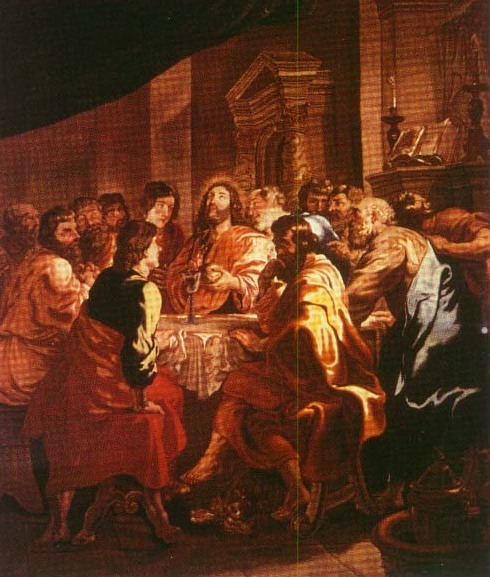
The Eucharist: Christ Totally, Body and Soul
By Pope John Paul II
- It must be added at this point that the body, which by the power of the Holy Spirit belongs from the first moment of its conception to the humanity of the Son of God, must eventually become in the Eucharist the spiritual food for men and women. In announcing the institution of this wonderful Sacrament, Jesus Christ will stress that in it his flesh (under the species of bread) will be able to become food for people, thanks to the working of the Holy Spirit who gives life.
In this regard, the words he said near Capernaum are very significant: "It is the Spirit that gives life, while the flesh is of no avail" (Jn 6:63). While Christ left us his flesh as spiritual food, he wanted at the same time to teach us about that state of "consecration" and of holiness which, by the power of the Holy Spirit, was and is a prerogative even of his Body in the mystery of the Incarnation and of the Eucharist.
Excerpt from L'Osservatore Romano June 11, 1990
On the Cross Jesus suffered so that in the Blessed Sacrament we may know the love of the Father, the Son and the Holy Spirit.
Bodily Resurrection
By Pope John Paul II
- We can say that Christ's mission truly reaches its zenith in the Paschal mystery, where the close connection between Christology and Pneumatology opens up on the eschatological horizon before the eyes of believers and the research of theologians. But this perspective includes the ecclesiological level also; since "the Church ... proclaims the one who gives ... life: the life-giving Spirit; she proclaims the Spirit and cooperates with the Spirit in giving life. For, 'although your bodies are dead because of sin ... your spirits are alive because of righteousness' (Rom 8:10), the righteousness accomplished by the Crucified and Risen Christ. And in the name of Christ's Resurrection the Church serves the life that comes from God Himself, in close union with and humble service to the Spirit (Enc. Dominum et Vivificantem, n. 58).
- At the heart of this service is the Eucharist. This Sacrament, in which Christ's redemptive gift continues and is renewed incessantly, contains as well the life-giving power of the Holy Spirit. Therefore, the Eucharist is the Sacrament in which the Spirit continues to work and to "reveal Himself" as the vital human principle in time and eternity. The Spirit is the source of light for the mind and of strength for conduct, according to the words of Jesus in Capernaum: "It is the Spirit who gives life ... The words which I have spoken to you" (concerning the "bread which comes down from heaven") "are spirit and life" (Jn 6:63).
Excerpt from L'Osservatore Romano August 13, 1990
"The Christ of Bethlehem
is the Christ of Galilee,
is the Christ of the Crucifixion,
is the Christ of the Resurrection,
is the Christ of the Eucharist."
- John Cardinal O'Connor
Jesus Christ: Inauguration and Fulfilment of The Kingdom of God
By Pope John Paul II
- The Church, which "in the course of the centuries is always advancing towards the plenitude of divine truth, until eventually the words of God are fulfilled in her" (DV, 8), prays to the Father in every Eucharistic celebration that his Kingdom may come. She lives in fervent expectation of the glorious coming of the Lord and Saviour Jesus who will offer to the divine majesty "an eternal and universal kingdom: a kingdom of truth and life, a kingdom of holiness and grace, a kingdom of justice, love and peace" (Preface of the Solemnity of Christ the King).
This expectation of the Lord is constantly a source of confidence and strength. It stimulates the baptized, who have become partakers in Christ's royal dignity, to live every day "in the Kingdom of the beloved Son", to bear witness to and proclaim the presence of the Kingdom with the same works as Jesus (cf. Jn 14:12). In virtue of this witness of faith, the Council teaches, the world will be imbued with the spirit of Christ and attain more effectively its end in justice, charity and peace (LG, 36).
Excerpt from L'Osservatore Romano March 23, 1987
Jesus
Unites His
Body The Church
In
Love in The
Eucharist
Eternally in The Trinity
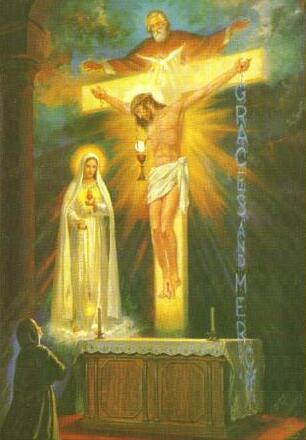
The Eucharist and The Holy Spirit
By Pope John Paul II
- Jesus' promise: "...before many days you shall be baptized with the Holy Spirit" (Acts 1:5), indicates the special link between the Holy Spirit and baptism. We saw in the previous reflection that, beginning with John's baptism of penance at the Jordan when he announced the coming of Christ, we are brought close to him who will baptize "with the Holy Spirit and with fire". We are also brought close to that unique baptism with which he himself was to be baptized (cf. Mk 10:38): the sacrifice of the Cross offered by Christ "through the eternal Spirit" (Heb 9: 14), so as to become "the last Adam who became a life-giving spirit", according to the statement of St Paul (cf. I Cor 15:45). We know that on the day of the resurrection Christ granted to the apostles the Spirit, the giver of life (cf. Jn 20:22), and also later at Pentecost when all were "baptized with the Holy Spirit" (cf. Acts 2:4).
- There is therefore an objective relationship between Christ's paschal sacrifice and the gift of the Spirit. Since the Eucharist mystically renews Christ's redemptive sacrifice, one can easily see the intrinsic link between this sacrament and the gift of the Spirit. The Holy Spirit, in founding the Church through his coming on the day of Pentecost, established it in objective relationship to the Eucharist, and ordered it towards the Eucharist.
Jesus had said in one of his parables: "The kingdom of heaven may be compared to a king who gave a marriage feast for his son" (Mt 22:2). The Eucharist is the sacramental anticipation and, in a certain sense, a "foretaste" of that royal feast which the Apocalypse calls "the marriage supper of the Lamb" (cf. Apoc 19:9). The bridegroom who is at the centre of that marriage feast, and of its Eucharistic foreshadowing and anticipation, is the Lamb who "took away the sins of the world", the Redeemer.
- In the Church, born of the baptism of Pentecost, when the apostles, and with them the other disciples and followers of Christ, are "baptized with the Spirit", the Eucharist is and remains until the end of time the Sacrament of the Body and Blood of Christ.
In it is present "the blood of Christ, who through the eternal Spirit offered himself without blemish to God" (Heb 9:14); the blood "poured out for many" (Mk 14:24) "for the forgiveness of sins" (Mt 26:28); the blood "which purifies your conscience from dead works" (cf. Heb 9:14); the "blood of the covenant" (Mt 26:28). Jesus himself when instituting the Eucharist, says: "This cup... is the new covenant in my blood " (Lk 22:20; cf. 1 Cor 11:25), and he tells the apostles: "Do this in remembrance of me" (Lk 22:19).
In the Eucharist—on each occasion—there is re-presented the sacrifice of the Body and Blood offered by Christ once for all on the Cross to the Father for the redemption of the world. The Encyclical Dominum et Vivificantem states: "In the sacrifice of the Son of Man the Holy Spirit is present and active.... The same Christ Jesus in his own humanity opened himself totally to this action... which from suffering enables salvific love to spring forth" (n. 40).
- The Eucharist is the sacrament of this redemptive love, closely connected with the Holy Spirit's presence and action. At this point how can we fail to recall Jesus' words in the synagogue of Capernaum, after the multiplication of the bread (cf. Jn 6:27), when he proclaimed the necessity of being nourished on his body and blood? Many of his hearers thought his discourse "on eating his body and drinking his blood" (cf. Jn 6:53) "a hard saying" (Jn 6:60). Realizing their difficulty, Jesus said to them: "Do you take offense at this? Then what if you were to see the Son of man ascending where he was before?" (Jn 6:61-62). That was an explicit allusion to his future ascension into Heaven. At that very point he added a reference to the Holy Spirit which would be fully understood only after the ascension. He said: "It is the Spirit that gives life, the flesh is of no avail; the words that I have spoken to you are spirit and life" (Jn 6:63).
Jesus, hearers understood in a "material" sense that first announcement of the Eucharist. The Master immediately explained that his words would be clarified and understood only through the "Spirit, the giver of life ". In the Eucharist Christ gives us his body and blood as food and drink, under the appearance of bread and wine, just as during the paschal meal at the Last Supper. Only through the Spirit, the giver of life, can the Eucharistic food and drink produce in us "communion", that is to say, the salvific union with Christ crucified and glorified.
- There is a significant fact linked to the Pentecost event: from the earliest times after the descent of the Holy Spirit the apostles and their followers, converted and baptized, "devoted themselves to the breaking of bread and the prayers" (Acts 2:42), as if the Holy Spirit himself had directed them towards the Eucharist. In the Encyclical Dominum et Vivificantem I stated: "Guided by the Holy Spirit, the Church from the beginning expressed and confirmed her identity through the Eucharist" (n. 62).
The primitive Church was a community founded on the teaching of the apostles (Acts 2:42), completely animated by the Holy Spirit who enlightened the believers to understand the Word, and gathered them together in charity around the Eucharist. Thus the Church grew into a multitude of believers who "were of one heart and soul" (Acts 4:32).
- In the same Encyclical already quoted we read: "Through the Eucharist, individuals and communities, by the action of the Paraclete-Counsellor, learn to discover the divine sense of human life" (a. 62). They discover the value of the interior life, realizing in themselves the image of the Triune God, which is always presented to us in the books of the New Testament and especially in St Paul's letters, as the Alpha and Omega of our lives: that is to say, the principle according to which man is created and modeled, and the last end to which he is directed and led by the will and plan of the Father, reflected in the Son-Word and in the Spirit-Love. It is a beautiful and profound interpretation which patristic tradition, summarized and formulated in theological terms by St Thomas (cf. Summa Theol., I, q.93, a.8), has given of the key principle of Christian spirituality and anthropology. This is how it is expressed in the Letter to the Ephesians: "For this reason I bow my knees before the leather, from whom every family in heaven and on earth is named, that according to the riches of his glory he may grant you to be strengthened with might through his Spirit in the inner man, and that Christ may dwell in your hearts through faith; that you, being rooted and grounded in love, may have power to comprehend with all the saints what is the breadth and length and height and depth, and to know the love of Christ which surpasses knowledge, that you may be filled with all the fullness of God" (3:14-19).
- It is Christ who gives us this divine fullness (cf. Col 2:9f.) through the action of the Holy Spirit. Thus, filled with divine life, Christians enter and live in the fullness of the whole Christ, which is the Church, and, through the Church, in the new universe which is gradually being constructed (cf. Eph 1:23; 4:12-13; Col 2:10). At the centre of the Church is the Eucharist, where Christ is present and active in mankind and in the whole world by means of the Holy Spirit.
Excerpt from L'Osservatore Romano September 13, 1989
The Holy Spirit in the Early Church
By Pope John Paul II
- Moreover, the whole life of the primitive community at Jerusalem bears the signs of the Holy Spirit who is its invisible guide and inspirer. The overall view of it given by Luke enables us to see in that community the model as it were of the Christian communities formed throughout the centuries, including parishes and religious congregations, in which the fruit of the "fullness of the Holy Spirit" is given tangible form in some basic forms of organization, codified in part in the very law of the Church.
They are principally the following: "communion" (koinonia) in fraternity and love (cf. Acts 2:42), so that it could be said of the Christians that they were "of one heart and soul" (Acts 2:32): the community spirit in handing over their goods to the apostles for distribution to each according to his need (Acts 4:34-37) or in their use, while retaining their ownership, so that "no one said that any of the things he possessed was his own. (4:32; cf. 2:44-45; 4:34-37); communion in "devoting themselves to the apostles' teaching" (Acts 2:42) and their "testimony to the resurrection of the Lord Jesus" (Acts 4:33); communion in the "breaking of bread" (Acts 2:42), that is, in the common meal according to the Jewish custom, into which the Christians, however, inserted the Eucharistic rite (cf. 1 Cor 1:16; 11:24; Lk 22:19; 24:35); communion in the prayers (Acts 2:42, 46-47). The word of God, the Eucharist, prayer and fraternal charity constituted the quadrilateral within which the community lived, grew, and became strong.
5 On their part the apostles, "with great power gave their testimony to the resurrection of the Lord Jesus" (4:33), and they worked "many signs and wonders" (5:12), as they had asked in the prayer in the Upper Room: "thou stretches out thy hand to heal, and signs and wonders are performed through the name of thy holy servant Jesus" (Acts 4:30). They were signs of the presence and action of the Holy Spirit, to whom the entire life of the community was referred. Even the guilt of Ananias and Sapphira, who pretended to bring to the apostles and the community the whole price of the property they had sold while holding back part of the proceeds, is regarded by Peter as a fault against the Holy Spirit: "You have lied to the Holy Spirit" (5:3); "How is it that you have agreed together to tempt the Spirit of the Lord?" (Acts 5:9). It was not a case of a "sin against the Holy Spirit" in the sense in which the Gospel speaks (cf. Lk 12:10) and which would be handed down in the Church's moral and catechetical texts. Rather, it was a failure to maintain the unity of the Spirit in the bond of peace, as St Paul would say (Eph 4:3). It was therefore a presence in professing that Christian community in charity, whose soul is the Holy Spirit!
Excerpt from L'Osservatore Romano November 29, 1989
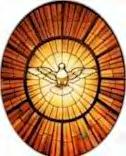
The Holy Spirit in the Creed
By Our Holy Father, Pope John Paul II
- We have also seen that Jesus Christ revealed the Holy Spirit while He carried out His messianic mission, in which He declared that He was working "with the power of the Holy Spirit" (for example, in expelling demons: cf. Mt 12:28). But one might say that that revelation is concentrated and condensed in the close of His mission with the announcement of His return to the Father. The Holy Spirit will be—after His departure—"a new Advocate". It will be He, "the Spirit of truth", who will guide the Apostles and the Church throughout history: "I will ask the Father and He will give you another Advocate to be with you always, the Spirit of truth, whom the world cannot accept, because it neither sees nor knows Him" (Jn 14:16-17). He who will come from the Father in Christ's name, "will teach you everything and remind you of all that I taught you" (Jn 14:26). And again: "When He comes, He will convict the world in regard to sin, and righteousness and condemnation" (Jn 16:8). This is the promise; this, one can say, is the testament which, along with the ones regarding love and the Eucharist, Jesus leaves to His own during the Last Supper.
Excerpt from L'Osservatore Romano November 5, 1990
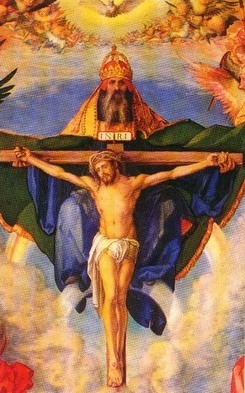
Breathe in me
O Holy Spirit
That my thoughts
may all be holy;
Act in me
O Holy Spirit
That my work, too,
may be holy;
Draw my heart
O Holy Spirit
That I may love but
what is holy;
Strengthen me
O Holy Spirit
To defend all
that is holy;
Guard me then
O Holy Spirit
That I always
may be holy.
-St. Augustine
The Soul of the Church
By Pope John Paul II
- We are speaking especially about the spirit as life-giving principle of the Church. We saw earlier during the Christological catechetical series that from the start of His messianic mission Jesus gathered around Himself disciples; from among them He chose the Twelve, called Apostles, and from among them he assigned the prime role as His witness and representative to Peter (cf. Mt 16:18). When on the eve of His sacrifice on the Cross, He instituted the Eucharist, He commanded and empowered these Apostles to celebrate it in His memory (cf. Lk 22:19; I Cor 11: 24-25). After the Resurrection He conferred on them the power to forgive sins (cf. Jn 20:22-23) and gave them the command to evangelize the whole world (cf. Mk 16:15).
We can say that all of that is tied to the announcement and the promise of the Holy Spirit's coming which occurred on the day of Pentecost, as the Acts of the Apostles relates (2:1-4).
Excerpt from L'Osservatore Romano December 3, 1990
Spirit: Source of Sacramental Life
By Pope John Paul II
- As for the Eucharist, in the New Testament its link with the Holy Spirit is marked more or less directly in the text of John's Gospel which recounts Jesus' announcement in the synagogue at Capernaum about the institution of the Sacrament of His Body and Blood: "It is the Spirit which gives life, while the flesh is of no avail; the words I have spoken to you are spirit and life" (Jn 6:63). Both the Word and the Sacrament have life and operative effectiveness from the Holy Spirit.
Christian Tradition is aware of this bond between the Eucharist and the Holy Spirit which was expressed, and still is today, during the Mass when, in the epiklesis the Church requests the sanctification of the gifts offered upon the altar: "by the power of your Spirit" (Eucharistic Prayer III); "let Your Spirit come upon them" (Eucharistic Prayer II); "bless and approve our offering" (Eucharistic Prayer I). The Church emphasizes the mysterious power of the Holy Spirit for the completion of the Eucharistic consecration, for the sacramental transformation of bread and wine into the Body and Blood of Christ, and for the communication of grace to those who participate in it and to the entire Christian community.
Excerpt from L'Osservatore Romano February 4, 1991
Holy Spirit Enlivens and Animates Church
By Pope John Paul II
- St Paul teaches us that the indwelling of the Holy Spirit within us is closely connected with Jesus' Resurrection and is also the basis of our final resurrection: "If the Spirit of him who raised Jesus from the dead dwells in you, he who raised Christ Jesus from the dead will give life to your mortal bodies also through his Spirit who dwells in you" (Rom 8:11).
In eternal happiness we will live in the joyful fellowship that is now prefigured and anticipated by the Eucharist. Then the Spirit will bring to full maturity all the seeds of communion, love and brotherhood that have blossomed during our earthly pilgrimage. As St Gregory of Nyssa says, "surrounded by the unity of the Holy Spirit as the bond of peace, all will be one Body and one Spirit" (Hom. 15 in Cant.).
Excerpt from L'Osservatore Romano July 15, 1998
Daily Prayer to the Holy Spirit
Most Holy Spirit,
Beloved of my soul,
I adore You.
Enlighten me, guide me,
strengthen me, console me.
Tell me what I should do,
give me Your orders.
I promise to submit myself
to all that you desire of me
and to accept all that You permit
to happen to me.
Let me only know Your will.
Most Holy Spirit bring peace to the world.
Prayer for a New Pentecost
Come, Holy Spirit, come by means of the powerful intercession of the Immaculate Heart of Mary,
our well-beloved Spouse.
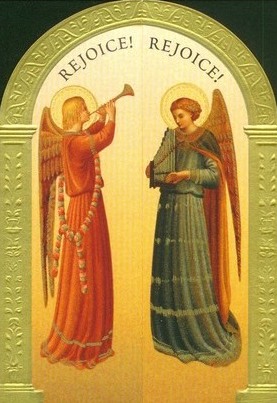
Reawaken the Desire for Eternal Life
THE GREAT JUBILEE
by Pope John Paul II
- In inviting us to commemorate 2,000 years of Christianity, the Jubilee takes us back to the event that inaugurates the Christian era: the birth of Jesus. Luke's Gospel tells us of this extraordinary event in simple and moving words: Mary "gave birth to her first born son and wrapped him in swaddling clothes, and laid him in a manger, because there was no place for them in the inn" (2:7).
Jesus' birth makes visible the mystery of the Incarnation already realized in the Virgin's womb at the time of the Annunciation. In fact, she gives birth to the child that, as the docile and responsible instrument of the divine plan, she had conceived by the power of the Holy Spirit. Through the humanity assumed in Mary's womb, the eternal Son of God begins to live as a child, and prows in wisdom and in stature, and in. favour with God and man" (Lk 2:52). Thus he manifests himself as true man.
- This truth is stressed by John in the Prologue of his gospel when he says: "The Word became flesh and dwelt among us" (1:14). By saying "became flesh", the Evangelist is alluding to his human nature not only in its mortal condition, but also in its entirety. The Son of God assumed all that is human, except sin. The Incarnation is the fruit of an immense love, which spurred God willingly to share our human condition to the full.
In becoming man, the Word of God brought about a fundamental change in the very condition of time. We can say that in Christ human time was filled with eternity.
The Word existed in perfect communion with the Father
This transformation touches the destiny of all humanity, since "by his Incarnation, he, the Son of God, has in a certain way united himself with each man" (Gaudium et spes, n. 22). He came to offer everyone participation in his divine life. The gift of this life includes sharing in his eternity. Jesus said so especially with regard to the Eucharist: "He who eats my flesh and drinks my blood has eternal life" (Jn 6:54). The effect of the Eucharistic banquet is that we already possess this life. Elsewhere Jesus indicated the same possibility with the symbol of the living water that could quench thirst, the living water of his Spirit given in view of eternal life (cf Jn 4:14). The life of grace thus reveals a dimension of eternity that lifts up our earthly existence and directs it, with true continuity, to our entrance into heavenly life.
- The communication of Christ's eternal life also means that we share in his attitude of filial love for the Father.
In eternity, "the Word was with God" (Jn 1:1), that is, in a perfect bond of communion with the Father. When he became flesh, this bond began to be expressed in all Jesus' human behaviour. On earth the Son lived in constant communion with the Father, in an attitude of perfect loving obedience.
The entry of eternity into time is the entrance, in Jesus' earthly life, of the eternal love that unites the Son to the Father. The Letter to the Hebrews alludes to this when it speaks of Christ's inner attitude at the very moment he enters the world: "Lo, I have come to do your will, O God" (10:7). The immense "leap" from the heavenly life of the Son of God into the abyss of human existence is motivated by his will to fulfill the Father's plan in total self-giving.
We are called to assume this same attitude, walking on the way opened by the Son of God made man, so that we can share his journey to the Father. The eternity that enters into us is a sovereign power of love that seeks to guide our whole life to its ultimate purpose, hidden in the mystery of the Father. Jesus himself indissolubly linked the two movements, descent and ascent, which define the Incarnation: "I came from the Father and have come into the world; again, I am leaving the world and going to the Father" (Jn 16:28).
Eternity has entered human life. Now human life is called to make the journey with Christ from time to eternity.
- If in Christ time is raised to a higher level, receiving access to etemity, this implies that the approaching millennium must not be considered as merely the next step in the course of time, but as a stage in humanity's journey towards its definitive destiny.
The Year 2000 is not only the door to another millennium; it is the door to eternity that, in Christ, continues to open onto time to give it its true direction and authentic meaning.
We must reawaken the desire for eternal life
It discloses to our mind and our heart a far broader perspective in which to consider the future. Time is often unappreciated. It seems to disappoint man with its precariousness, its rapid flow, which makes all things futile. But if eternity has entered time, then time itself must be recognized as rich in value. Its inexorable flow is not a journey towards nothingness, but a journey to eternity.
The real danger is not the passing of time, but using it badly, rejecting the eternal life offered by Christ. The desire for life and eternal happiness must be ceaselessly reawakened in the human heart. The celebration of the Jubilee is meant precisely to increase this desire, helping believers and the people of our time to open their hearts to an unbounded life.
L'Osservatore Romano December 17/24, 1997
"The joy of the Jubilee would not be complete if our gaze did not turn to her who in full obedience to the Father gave birth to the Son of God in the flesh for our sake. For Mary 'the time to give birth' came to pass in Bethlehem (Lk 2:6), and filled with the Spirit she brought forth the first-born of the new creation." (Pope John Paul II)
"For 2,000 years, the Church has been the cradle in which Mary places Jesus and entrusts Him to the adoration and contemplation of all peoples. May the humility of the Bride cause to shine forth still more brightly the glory and power of the Eucharist, which she celebrates and treasures in her heart. In the sign of the consecrated Bread and Wine, Christ Jesus risen and glorified, the light of the nations, reveals the enduring reality of His Incarnation. He remains living and real in our midst in order to nourish the faithful with His Body and Blood." (Incarnationis Mysterium, Pope John Paul II)
|
